
Now that several years have passed since the Great East Japan Earthquake and the nuclear accident at TEPCO’s Fukushima Daiichi Nuclear Power Station, how much has Japan learned the lessons from Fukushima? Taking the opportunity from the release of the hearings from the late Mr. Masao Yoshida, which provided new information, interested former working group members of the Independent Investigation Commission on the Fukushima Nuclear Accident that released the report in February 2012 looked back at this four years.
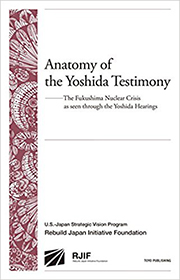 After a two month preparation period, this project was officially launched in December 2014. From several points of view, we extracted topics on the crisis response and management.
After a two month preparation period, this project was officially launched in December 2014. From several points of view, we extracted topics on the crisis response and management.
- Incident Command System (ICS)
- Operation
- Logistics
- Governance
- Leadership
- Safety and Security
- Ways to learn lessons
On reviewing the crisis management during the nuclear accident as well as the result of the analysis by the Independent Investigation Commission, we tried to listen to the voices of youth that have been rarely expressed in public. Although the Independent Commission covered the point of view of the vulnerable from the disaster in regards to the resident evacuation issue, we could not include those of the young generation.
Our project co-hosted an event, “The Fukushima Nuclear Crisis as seen through the Yoshida Hearings,” with the Global Security Research Institute (G-SEC) at Keio University on February 4, 2015, and the four project members discussed with approximately 20 selected students topics such as “At that time, how did you see the responses by the government and TEPCO?” and “If you were a person in charge of the crisis handling, how would you think and what kind of decision would you have made?”
The report consists of two parts; the first part is an interpretation of the Yoshida testimony by Dr. Yoichi Funabashi, the second part is the four project members’ review of the three years since the announcement of the report. (Japanese version also includes the third part, which is the transcript of the discussion with the students at the event.)
Report
“Anatomy of the Yoshida Testimony
– The Fukushima Nuclear Crisis as seen through the Yoshida Hearings”
Several members of working group of the Independent Investigation Commission on the Fukushima Nuclear Accident examined whether Japan has learned the lessons from Fukushima since the accident through the analysis of the hearing records from the late Mr. Masao Yoshida, former Site Superintendent of the TEPCO Fukushima Daiichi Nuclear Power Station, which was released in September 2014 (so-called “Yoshida Testimony”). Based on the report by the Independent Investigation Commission, this project analyzes the testimony closely from several points of view.
Author: Rebuild Japan Initiative Foundation
Publisher: TOYO PUBLISHING
Price: ¥1,800 +Tax
First Published: August 28, 2015
ISBN-10: 4809678016
ISBN-13: 978-4809678011
Foreword: From Investigating the Accident to Investigating the Crisis
Part 1: A Reading of the Yoshida Hearings
Yoichi FUNABASHI
Part 2: Three Years on from Publishing The Independent Investigation Report
(An analysis and investigation three years after the event by four members of the then Working Committee)
Kenta HORIO
Akihisa SHIOZAKI
Kazuto SUZUKI
Shin-etsu SUGAWARA
Afterword
Chronology of the Fukushima Nuclear Accident
The Symposium
The project co-hosted an event, “The Fukushima Nuclear Crisis as seen through the Yoshida Hearings,” with the Global Security Research Institute (G-SEC) at Keio University on February 4, 2015. The facilitators were Prof. Heizo Takenaka from Keio University and RJIF Chairman Yoichi Funabashi, and the panelists were the working group members of the Independent Investigation Commission at the time: Mr. Kenta Horio, Mr. Akihisa Shioaki, Prof. Kazuto Suzuki, and Dr. Shin-etsu Sugawara.
They exchanged opinions with 20 students having strong interest on the Fukushima Nuclear Accident actively and the discussion grew excited.
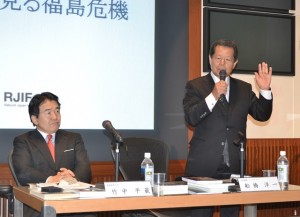
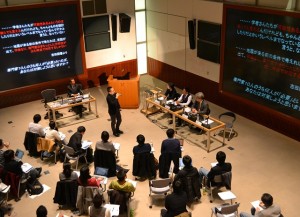
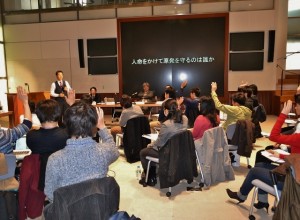
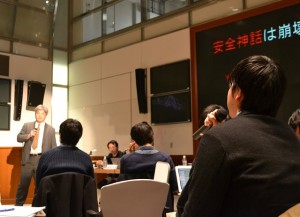
Project Members
Independent Investigation Commission Report Inspection Team

Yoichi Funabashi
Chairman, Rebuild Japan Initiative Foundation

Kazuto SUZUKI
Professor, the Graduate School of Law, Hokkaido University

Shin-etsu SUGAWARA
Senior Researcher, the Institute of Social and Economic Research, General Central Research Institute of Electric Power Industry

Akihisa SHIOZAKI
Attorney at Law, Partner, Nagashima Ohno & Tsunematsu
He was secretary to the Chief Cabinet Secretary in 2006-07. He is also Vice Chair of the Civil Intervention Violence Committee, the Dai-ichi Tokyo Bar Association, auditor of the Rebuild Japan Initiative Foundation, and served as a member of the Working Group for Part 2 of the Independent Investigation.

Kenta HORIO
Expert investigator, Permanent Mission of Japan to the international Organization in Vienna
Advisor

Toshihiro OKUYAMA
Editorial board member, the Asahi Shimbun
Editorial/ Administrative Office

Takashi OTSUKA
Science journalist

Kay KITAZAWA
Research Director, the Rebuild Japan Initiative Foundation

Natsuki FUJITA
Intern, the Rebuild Japan Initiative Foundation
 APIニュースレター 登録
APIニュースレター 登録